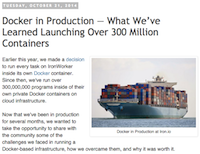Iron.io Speaking on Docker in Production [Feb 11th]
 Travis Reeder, CTO and co-founder at Iron.io, and Reed Allman, a systems engineer, will be talking about Docker in Production at an upcoming meetup.
Travis Reeder, CTO and co-founder at Iron.io, and Reed Allman, a systems engineer, will be talking about Docker in Production at an upcoming meetup.
Luke Marsden from ClusterHQ, John Fiedler from RelateIQ, and Jérôme Petazzoni from Docker will also talk abou their experiences on the subject. The ClusterHQ meetup will be held on Wed, Feb 11th at Heavybit Industries in San Francisco, CA.
Here’s the description of their talk:
Docker in Production: Lessons from Launching 500M Containers
Travis Reeder and Reed Allman will talk about Docker's use in production at Iron.io. The two will discuss the requirements and process for integrating Docker into IronWorker, its event-based computing service, as well as benefits and challenges faced when using it in production at high scale. They will also discuss the future possibilities around using Docker as a general deployment tool including using registries and wrapping Go binaries in Docker to provide any number of orchestration tools
Other speakers include:
- Luke Marsden, ClusterHQ
- John Fiedler, RelateIQ
- Jérôme Petazzoni, Docker
 |
| Meetup: Docker in Production |
About the Speakers
 Travis Reeder is co-founder and CTO of Iron.io, heading up the architecture and engineering efforts. He is a systems architect and hands-on technologist with 15 years of experience developing high-traffic web applications including 5+ years building elastic services on virtual infrastructures. He is an expert in Go and is a leading speaker, writer, and proponent of the language. He has written several widely popular posts on Go and Docker.
Travis Reeder is co-founder and CTO of Iron.io, heading up the architecture and engineering efforts. He is a systems architect and hands-on technologist with 15 years of experience developing high-traffic web applications including 5+ years building elastic services on virtual infrastructures. He is an expert in Go and is a leading speaker, writer, and proponent of the language. He has written several widely popular posts on Go and Docker.
 Reed Allman is a system-level engineer for Iron.io working in Go along with Docker and RocksDb to solve hard problems within high-scale fault-tolerant distributed systems. Prior to Iron.io, he worked on a research project with Google to build refactoring tools for the Go language. By his estimation, he's read the language spec more times than is healthy and has gained a somewhat irrational view of programming in anything that doesn’t have channels.
Reed Allman is a system-level engineer for Iron.io working in Go along with Docker and RocksDb to solve hard problems within high-scale fault-tolerant distributed systems. Prior to Iron.io, he worked on a research project with Google to build refactoring tools for the Go language. By his estimation, he's read the language spec more times than is healthy and has gained a somewhat irrational view of programming in anything that doesn’t have channels.

How Docker Helped Us Achieve the (Near) Impossible
In this post, we discuss the decisions behind using Docker, the requirements we had going in, and more details on what it enables us to do.

Docker in Production
In this post, we address some of the challenges we faced in running a Docker-based infrastructure in production, how we overcame them, and why it was worth it.
